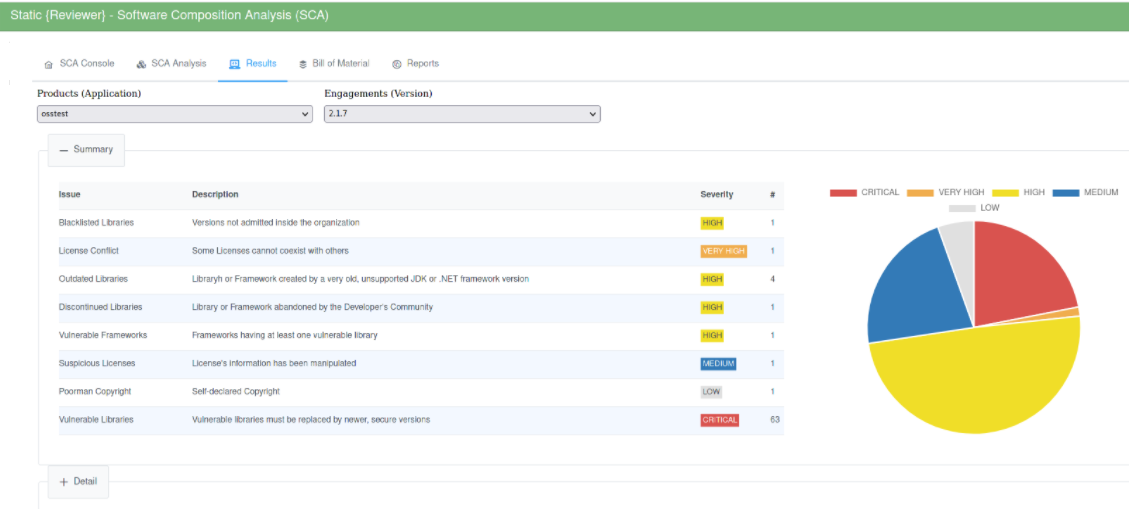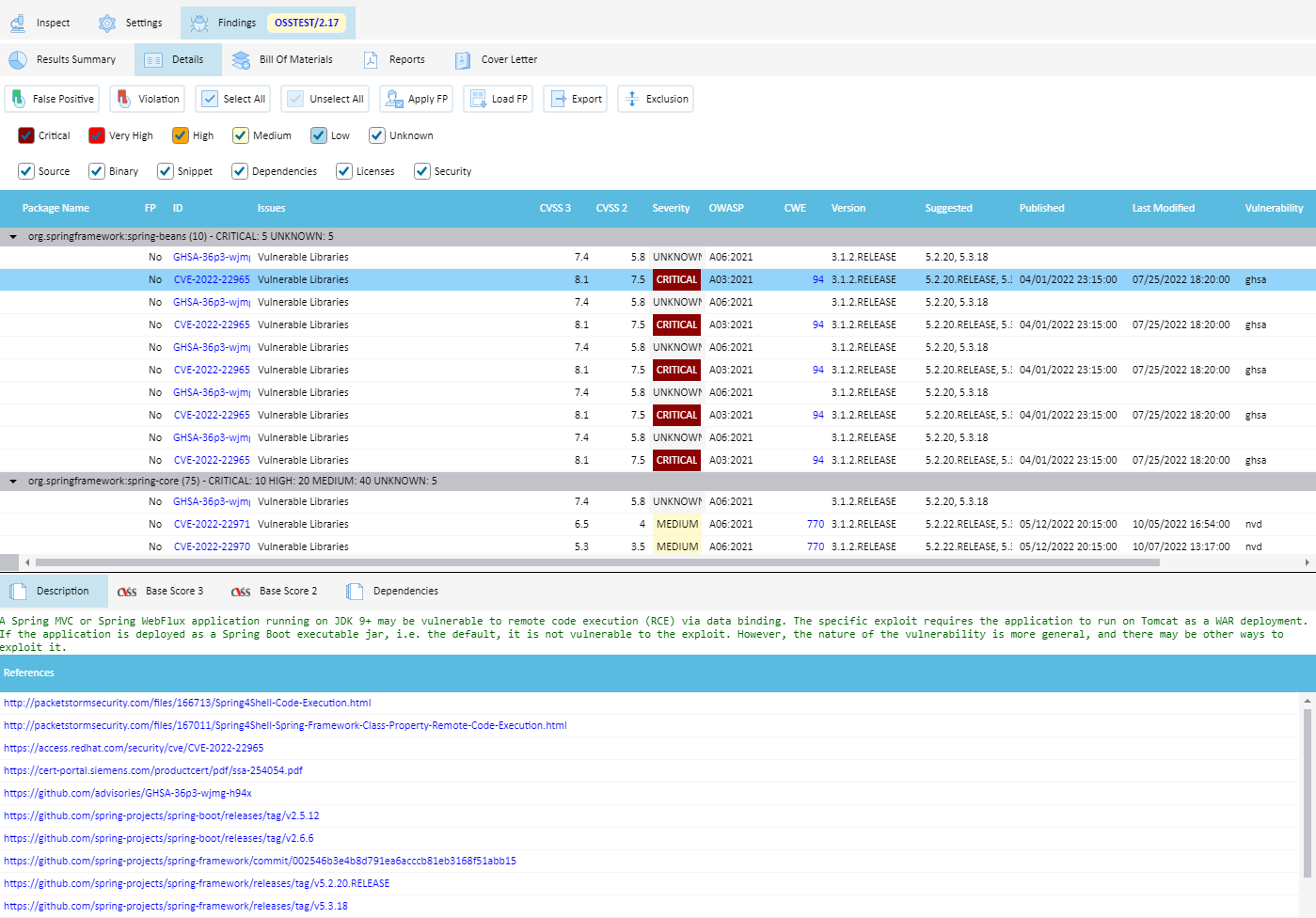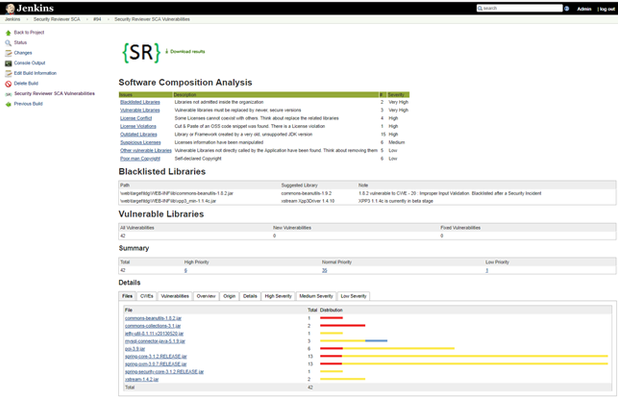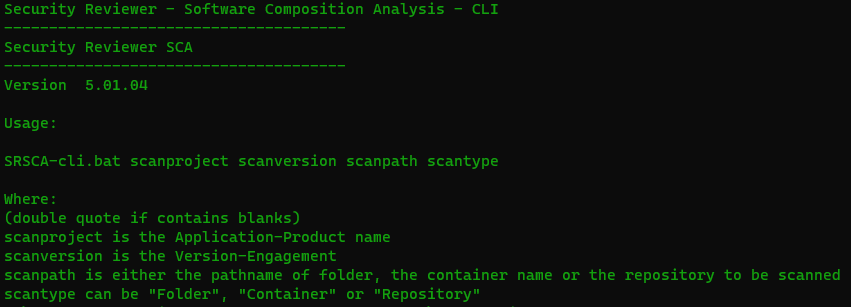| Table of Contents |
|---|
Security Reviewer – Software Many applications incorporate external open source and third-party components that enable developers to build new functionality quickly and efficiently. But while the use of open source components has many benefits, it also introduces risk.
Security Reviewer – Software Composition Analysis (SCA Reviewer) analyzes your application software, identifies project dependencies on 3rd-parties components, and builds a components inventory that lets you track any external piece of code that could be part of your application, directly inside your SDLC, as Jenkins Plugin , Bamboo Plugin or using the CLI Interface. It is able to identify Java, C/C++, Ruby, Groovy, Perl, PHP, JavaScript, TypeScript, Python, Rust, Scala, GO, R, Kotlin, Clojure, ErLang, Shell, PowerShell, LUA and Auto-IT components along with .NET assemblies and Objective-C, Objective-C++, SWIFT support. Once identified, SCA will automatically determine if those components have known, publicly disclosed, vulnerabilities as well as licenses-related issues.
Furher, SCA Reviewer is able to detect:
- Vulnerable Libraries
- Vulnerable Frameworks
- Vulnerable Containers
- Vulnerable Repositories
- Discontinued Libraries (abandoned by the community)
- Obsolete Libraries
- Poor Man copyrights
Technologies
SCA Reviewer is provided as:
- Web App, delivered as a group of Docker Images
- SCA Desktop. .NET Core app for Windows, Linux and macOS
- CI/CD plugin. Native Jenkins plugin. High experienced CI/CD integrations via CLI
- CLI
Web App
You can view details:
And drill-down to the single issue, a Fixed version is also suggested:
...
including all References and Exploits:
SCA Desktop
CI/CD plugin
Software Composition Analysis Desktop, Jenkins Jenkins and Bamboo native plugins and CLI Interface (test on many CI/CD platforms) provide a 360 degrees solution covering all your DevOps needs. 3rd-party libraries can be analyzed (Open Source Analysis-OSA) using a shared folder located on Network File System (NFS), a Nexus Repository or JFrog Artifactory for discovering Vulnerable Libraries, Vulnerable Frameworks, Blacklisted/ Discontinued/ Outdated / Obsolete/ Deprecated libraries and frameworks. Legal issues like: Blacklisted Licenses, Licenses Conflict, No-licensed libraries, Suspicious (modified) licenses and Poor-man Copyrights are fully-detected from the tool.
Dashboards
Security Reviewer SCA, further than our own dashboard (Team Reviewer) can publish results to a bunch of Dashboards like: OWASP Dependency Track, Kenna Security, CodeDx, Micro Focus Fortify SSC, SonarQube and ThreadFix, as well as to your preferred Defect Tracker (JIRA, BugZilla, etc.).
...
Command Line Interface (CLI)
SCA Reviewer offers a very simple CLI interface, suitable for your preferred DevOps integration,for Windows, Linux and macOS
Anchor analyzers analyzers
Analyzers
| analyzers | |
| analyzers |
SCA includes the following analyzers:
...
Analyzer
...
File Types Scanned
...
Analysis Method
...
SRslic **
...
ASP, ASPX, HTML, JSP, JSF, JAVA, C#, VB.NET, C, CPP, H, HPP, M, MM, SWIFT, PHP, JS, TS, RB, GROOVY, GY, PY, PERL, PL, SCALA, GO, R, KT, CLJ, ERL, SH, PS1, AU3, LUA, XML files
...
It is able to identify Java, C/C++, Ruby, Groovy, Perl, PHP, JavaScript, TypeScript, nodeJS, Python, Rust, Scala, GO, R, Kotlin, Clojure, ErLang, Shell, PowerShell, LUA and Auto-IT components along with .NET assemblies and Objective-C, Objective-C++, SWIFT support. Once identified, SCA will automatically determine if those components have known, publicly disclosed, vulnerabilities as well as licenses-related issues.
SCA includes the following analyzers:
Analyzer | File Types Scanned | Analysis Method |
SRslic ** | ASP, ASPX, HTML, JSP, JSF, JAVA, C#, VB.NET, C, CPP, H, HPP, M, MM, SWIFT, PHP, JS, TS, RB, GROOVY, GY, PY, PERL, PL, SCALA, GO, R, KT, CLJ, ERL, SH, PS1, AU3, LUA, XML files | Reveals Licenses in Whitelist, Licenses in Blacklist, License Conflicts, Suspicious Licenses, License Violations and Poor’s man copyrights found in source code. |
Artifactory | jFrog Artifactory | Analyzer which will attempt to locate a dependency on a jFrog Artifactory service by SHA-1 digest of the dependency. |
Archive | Zip archive format (*.zip, *.ear, *.war, *.jar, *.sar, *.apk, *.nupkg); Tape Archive Format (*.tar); Gzip format (*.gz, *.tgz); Bzip2 format (*.bz2, *.tbz2) | Extracts archive contents, then scans contents with all available analyzers. |
Assembly | .NET Assemblies (*.exe, *.dll) | Uses GrokAssembly.exe, which requires .NET Framework or Mono runtime to be installed, otherwise .NET Assemblies will be analyzed by FileInfo and NuSpec analyzers only. |
Packrat | CRAN | packrat.lock files (R language). |
RetireJS | JavaScript | It uses the manually curated list of vulnerabilities from the RetireJS community along with the necessary information to assist in identifying vulnerable components. Vulnerabilities documented by the RetireJS community usually originate from other sources such as the NVD, OSVDB, NSP, and various issue trackers. |
| Apache Ivy | Ivy is a dependency manager | Scans dependencies n ivy Ant extension |
CMake | CMake project files (CMakeLists.txt) and scripts (*.cmake) | Regex scan for project initialization and version setting commands. |
MSBuild | .NET Assembly | Analyzes MSBuild Projects |
MavenGradleAnt | Analyze Maven, Ant and Gradle build files for Java | Analyze pom.xml, build.gradle, and build.xml. |
GoDep | Analyze GitHub dependency files for GO Language, .go | Analyze vendor.conf, godeps.json, godeps.json gomod files, and gopkg.toml. |
| Distroless Images | Google Distroless Images | They contain only your application and its runtime dependencies |
Jar Analyzer | Java archive files (*.jar); Web application archive (*.war) | Examines archive manifest metadata, and Maven Project Object Model files (pom.xml). |
NSP | Node Security Project is used to analyze Node.js’ package.json files for known vulnerable packages. | Recently acquired by NPM inc., this service will be still available until September, 30. |
| SNYK | JavaScript, .NET, Java, TypeScript, Python, Ruby, Scala, GO | Scans scripts and dependencies |
Nuspec | Nuget package specification file (*.nuspec) | Uses XPath to parse specification XML. Analyze also packages.config and (*proj or sln), project.lock.json and project.assets.json or PackageReference. |
OpenSSL | OpenSSL Version Source Header File (opensslv.h) | Regex parse of the OPENSSL_VERSION_NUMBER macro definition. |
Ruby bundler‑audit | Ruby Gemfile.lock files | Executes bundle-audit and incorporates the results into the dependency-check report. |
Autoconf | Autoconf project configuration files (configure, configure.in, configure.ac) | Regex scan for AC_INIT metadata, including in generated configuration script. |
CocoaPods | CocoaPods .podspec and podfile.lock files | Extracts dependency information from specification file and lock file, for Objective-C and SWIFT projects. |
Composer Lock | PHP Composer and PHP Pear | Parses PHP Pear package.xml, PHP Composer lock and composer.json files for exact versions and dependencies. |
Node.js | NPM package specification files (package.json) | Parse JSON format for metadata. |
Python Metadata | Python source files (*.py); Package metadata files (PKG-INFO, METADATA); Package Distribution Files (*.whl, *.egg, *.zip) Anaconda and environment.yml | Regex scan of Python source files for setup tools metadata; Parse RFC822 header format for metadata in all other artifacts. Also scans dependencies in yml files. |
FileInfo-JarManifest** | jar, war, ear, dll, exe, lib, shared libs and machOS, UPX, PE executables | Reveals Blacklisted Libraries, Outdated Libraries, Other Vulnerable Libraries. |
Ruby Gemspec | Ruby makefiles (Rakefile); Ruby Gemspec files (*.gemspec) | Regex scan Gemspec initialization blocks, Rakefile and gemfile.lock for metadata. |
SWIFT | SWIFT Package Manager’s Package.swift | Extracts dependency information from swift package file. |
**awesome-C, awesome-CPP, cppreference, awesome-dotnet, awesome-javascript, awesome-typescript, SwifterSwift, Three20, PyPi, awesome-scala | Fresh updated lists of best (awesome) libraries, packages and frameworks, specialized for each Programming language | Seeks for new and updated libraries, packages and frameworks coming directly from programmer’s community. |
SBT | SCALA | Scans build.sbt for dependencies. |
| CRAN | R | Scans for add-on packages from CRAN |
| Akku.scm | R | Scans a Scheme from Akku.scm |
CPAN | Perl | Analyze dependencies in Makefile.PL. |
| Leiningen | Clojure | Scans Lein scripts |
| LuaRocks | LUA | Scans rocks packages |
ERL | Erlang HEX | Analyze dependencies in rebar.config. |
| Rust | Rust | Scans cargo.toml file |
| au3pm | Auto-IT | Scans json.au3 |
| Alpine | Alpine Linux package keeper (manager) | Scans signed tar.gz archives containing programs, configuration files, and dependency metadata |
| Debian | Debian Package Manager | Scan .deb packages |
| RPM | Red Hat Package Manager | Scan .rpm files |
| Bower | JavaScript | Scans bower.json |
| Chocolatey | Windows Packages | Scans c4b files |
| Clojars | Clojure | Scans Lein scripts and Cloure JAR files |
| Conan | C/C++ | Scans makefile |
**Security Reviewer’s SCA unique features
Package Managers
SCA supports several Package Managers.
All Solutions you need
Security Reviewer offers various solutions for Software Composition Analysis:
...
After the initial OSS audit is completed and the enterprise is in compliance with all of the licenses applicable to the OSS components used in its software products, management should implement an Open Source Policy. In its simplest terms, an Open Source Policy is a set of written rules that governs the management of OSS (both use of and contribution to) with detailed specifications as to how an enterprise will implement these rules on a daily basis. That policy should include a list of banned OSS license types that developers can reply upon when choosing whether to use and incorporate a specific OSS component. Any OSS license types not on the banned list should be reviewed with intellectual property counsel prior to their use. As part of the policy, the OSS inventory report created from the initial audit should be continually updated as a living document. The policy should also incorporate periodic training of OSS considerations for developers. This will keep an open dialogue between developers and intellectual property counsel as new OSS license types emerge and existing OSS licenses are tested in the court systems.
...
.
Anchor external external
External Data Sources
| external | |
| external |
-- Debian Security https://security-tracker.debian.org
-- Linux Security https://linuxsecurity.com/
-- RedHat Security https://access.redhat.com/security
-- Oracle Security Advisory https://www.oracle.com/technetwork/security-advisory
-- SuSe OVAL Descriptions https://www.suse.com/support/security/oval/
-- Ubuntu CVE Tracker https://people.canonical.com/~ubuntu-security/cve/main.html
-- Alpine Linux Security https://alpinelinux.org
-- CentOS Security https://www.centosblog.com/categories/security/
-- Microsoft Security Response Center https://portal.msrc.microsoft.com/en-us/security-guidance
-- OSS Index by Sonatype: https://ossindex.sonatype.org/
-- NVD by NIST: https://www.nist.gov/programs-projects/national-vulnerability-database-nvd
-- VulnDB: https://vuldb.com/
-- Maven Central: https://mvnrepository.com/repos/central (Java, Scala, Kotlin)
-- NuGet Packages: https://www.nuget.org/packages (.NET)
-- PyPy compatibility: https://bitbucket.org/pypy/compatibility/wiki/Home (Python)
-- Common Weakness Enumeration (CWE): http://cwe.mitre.org/
-- CVE Details: https://www.cvedetails.com/
SCA uses the following community-driven 'Awesome' lists too:
-- Awesome Java https://github.com/akullpp/awesome-java
-- Awesome .NET https://github.com/quozd/awesome-dotnet
-- Awesome Android https://github.com/JStumpp/awesome-android
-- Awesome C libraries https://github.com/kozross/awesome-c
-- Awesome C++ https://github.com/fffaraz/awesome-cpp
-- Awesome JavaScript https://github.com/sorrycc/awesome-javascript
-- Awesome TypeScript https://github.com/dzharii/awesome-typescript
-- Awesome Python https://awesome-python.com/ and https://pythonawesome.com
-- Awesome Ruby https://github.com/markets/awesome-ruby
-- Awesome Scala https://github.com/lauris/awesome-scala
-- Awesome GO https://github.com/avelino/awesome-go
-- Awesome PHP https://github.com/ziadoz/awesome-php
-- Awesome Swift https://github.com/matteocrippa/awesome-swift
-- Awesome iOS https://github.com/vsouza/awesome-ios
-- Awesome Kotlin https://github.com/KotlinBy/awesome-kotlin
-- Awesome Groovy libs https://github.com/kdabir/awesome-groovy
-- Awesome shell scripts https://github.com/alebcay/awesome-shell
-- Awesome R https://awesome-r.com
-- Awesome PowerShell https://github.com/janikvonrotz/awesome-powershell
-- Awesome Auto-It https://github.com/J2TeaM/awesome-AutoIt
-- Awesome LUA https://github.com/LewisJEllis/awesome-lua
-- Awesome Clojure https://github.com/razum2um/awesome-clojure
-- Awesome Erlang https://github.com/drobakowski/awesome-erlang
-- Awesome Rust https://github.com/rust-unofficial/awesome-rust
Further, SCA uses the libHunt service:
-- Java https://java.libhunt.com/
-- .NET https://dotnet.libhunt.com
-- Android https://android.libhunt.com/
-- C/C++ https://cpp.libhunt.com/
-- JavaScript/TypeScript https://js.libhunt.com/
-- Python https://python.libhunt.com
-- Ruby/Groovy https://ruby.libhunt.com/
-- Scala https://scala.libhunt.com/
-- GO https://go.libhunt.com/
-- PHP https://php.libhunt.com/
-- Swift https://swift.libhunt.com/
-- iOS https://ios.libhunt.com/
-- Kotlin https://kotlin.libhunt.com/
-- Rust https://rust.libhunt.com/
Regarding the license/legal issues, like Blacklisted Licenses (Strong CopyLeft included), License Conflict, License Violations, Suspicious Licenses (modified and missed licenses), Poor-man CopyRight, SCA uses the following external data sources:
-- SPDX: https://spdx.org/
-- Open Source Initiative: https://opensource.org/licenses
-- GNU compatible license list: http://www.gnu.org/licenses/license-list.html
-- Creative Commons: https://creativecommons.org/share-your-work/licensing-considerations/compatible-licenses/
-- Comparison of FOSS licenses: https://en.wikipedia.org/wiki/Comparison_of_free_and_open-source_software_licenses
-- FLOSS license chart: https://dwheeler.com/essays/floss-license-slide.html
...





